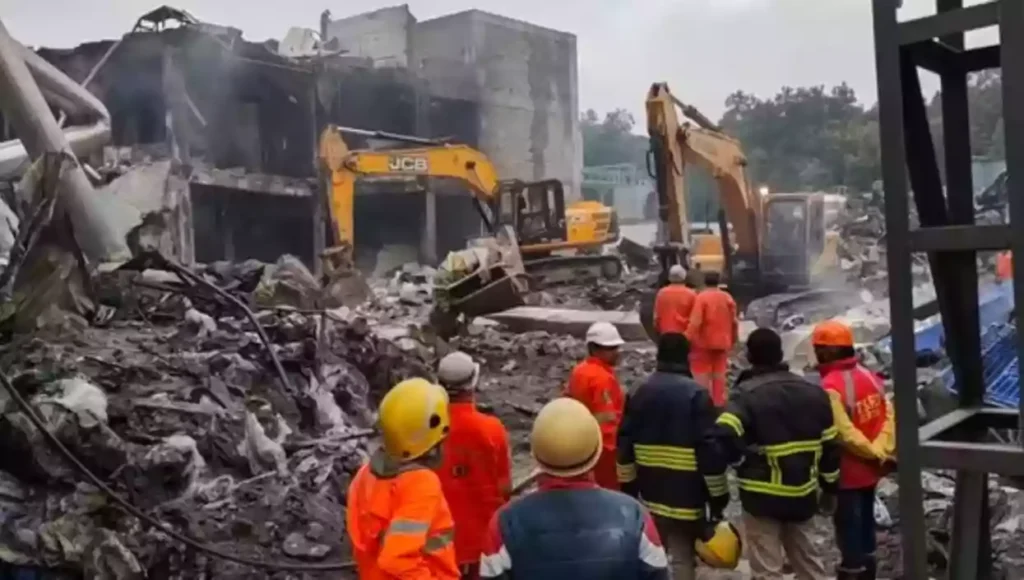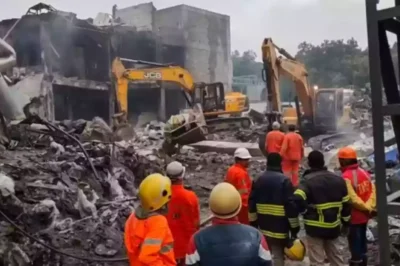
Blast Tragedy Rocks Sangareddy
On June 30, a devastating explosion tore through the Sigachi Industries pharmaceutical plant in Pashamylaram, Sangareddy district, Telangana. The blast, centred on the spray dryer reactor unit, resulted in the collapse of a building at around 9 a.m., killing at least 36 workers and injuring 34 more during a busy morning shift of over 140 people. The severity of the casualties, some victims were so badly burned that DNA testing was required for identification, has made this one of the deadliest industrial accidents in Telangana’s recent history.
Chief Minister’s Prompt Response
Telangana Chief Minister A. Revanth Reddy visited the site immediately following the accident, accompanying cabinet colleagues including the Industries and Labour ministers. Addressing the media, he called the aid “immediate assistance” rather than compensation, emphasizing swift help to families in distress. CM Reddy announced the following: the state will provide ₹1 lakh to each deceased worker’s family and ₹50,000 to the injured as emergency relief, all funded by the government. Additionally, he instructed that the cost of medical care would be fully covered by the state if required.
Major Compensation Package Announced
Going beyond emergency relief, CM Reddy confirmed that the state government had engaged with Sigachi Industries to ensure a compensation payout of ₹1 crore for each deceased worker’s family. For the injured, the compensation structure was: ₹10 lakh for those seriously hurt (e.g., suffering permanent disability) and ₹5 lakh for those with less severe injuries and an expected return to work.
Corporate Pledge and Accountability
Sigachi Industries, addressing the tragedy publicly, affirmed that it had lost 40 employees and pledged an ex-gratia payment of ₹1 crore to the families of the deceased, alongside full support for medical care and rehabilitation. The firm clarified that the explosion occurred in the spray dryer, not the reactor itself. Importantly, Sangareddy Police filed an FIR under serious sections of the Bharatiya Nyaya Sanhita against the factory management, citing culpable homicide and grievous hurt.
Inquiry and Institutional Reforms
A high-level committee, led by the Chief Secretary, was formed to oversee relief distribution, probe the incident, and ensure future safety. CM Reddy stressed that the investigation must rely on expert input and thorough inspections, not assumptions. He demanded detailed reports on safety compliance and periodic inspections by the Factories Department.
Wider Safety Clampdown
In addition to targeted inquiry, CM Reddy ordered comprehensive inspections of all chemical facilities across Telangana. He urged coordinated efforts from line departments for debris clearance, body recovery, and logistics. At the factory site, Industrial Minister Sridhar Babu rebuked Sigachi’s management for their absence and demanded accountability, questioning their lack of presence 24 hours after the blast.
Support for Victims’ Families
Beyond compensation, CM Reddy announced welfare measures for the children of deceased workers, committing them seats in government residential schools to secure their futures. Medical care for injured victims will be fully supported by state resources, with priority given to restoring health and livelihood.
Central Government Reacts
Prime Minister Narendra Modi expressed condolences and extended ex-gratia support of ₹2 lakh to each family of the deceased and ₹50,000 to injured individuals from the Prime Minister’s National Relief Fund.
High Human Toll Confirmed
While early reports cited varying death tolls, official figures stabilized at 36 confirmed fatalities, with more than 33 injured. Some accounts, especially from local media, reported as many as 45 fatalities, though these await confirmation from authorities. Currently, 58 survivors have been identified, while dozens remain unaccounted for, as rescue efforts continue.
Build Back Safer
This blast spotlights longstanding safety issues in industrial zones. Survivor claims suggest outdated machinery was in use despite prior warnings. Official sources confirmed the absence of essential safety equipment like fire alarms and heat sensors. The incident stresses the urgent need for stricter regulatory oversight and modern safety protocols.
Looking Ahead
The company said operations would remain suspended for approximately 90 days. Meanwhile, authorities are pressing for reforms: enhanced plant inspections, expert-led safety audits, and legal accountability for lapses. CM Reddy vowed that this tragedy must catalyse systemic reforms, not merely compensation disbursement.
The Pashamylaram blast has laid bare both the human and regulatory cracks in India’s industrial safety framework. With ₹1 crore aid pledged by both the state and firm, additional relief for the injured, education support for children, and a renewed push for accountability, this incident serves as a painful yet pivotal wake-up call. As investigations unfold and reforms take shape, the hope is that loss of life leads to lasting systemic change.









































Leave a Reply